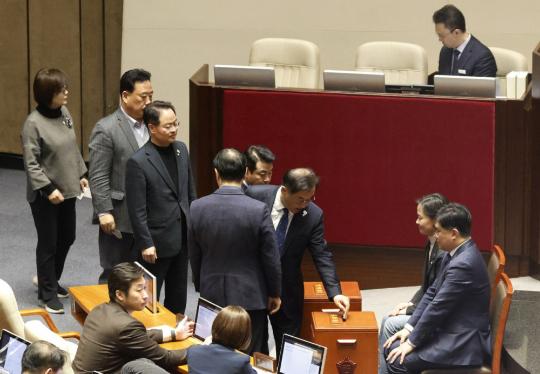ROK cycle of retribution likely to continue
Although the ROK parliament didn't pass the motion on Sunday to impeach President Yoon Suk-yeol for what is widely regarded as his self-serving imposition of martial law, his authority has been eroded "to the point of no return", for all intents and purposes, some observers say.
Yoon vowed to run an open government when he won the presidency in March 2022 with a margin of just 0.7 percent. But he has only paid attention to strengthening the Republic of Korea's alliances with the United States and Japan, at the cost of the ROK's relations with other neighbors, and has failed to connect with the ROK people.
Despite the image he has tried to present to the world that he is a pro-democracy and open-minded leader, Yoon seems to have little time or patience to listen to different points of view, even within his own party, and his abiding political mindset is "my way or the highway".
That the former prosecutor twice vetoed a bill seeking a special counsel inquiry into allegations against his wife's suspected graft has seen his approval rating drop to a dismal 19 percent last month, a historical low since the restoration of "democracy" in the ROK in 1987.
Although the Yoon government has done a good job controlling inflation and unemployment after taking power, the ROK's year-on-year economic growth rate plummeted from 2.6 percent in 2022 to 1.4 percent last year, though it is projected to rebound to 2.3 percent this year. The lackluster economy has weakened public confidence in the Yoon government, and also aggravated the political polarization in the ROK, not only between Yoon's People Power Party and the Democratic Party, the largest opposition party, but also within the PPP itself.
Although the PPP blocked Yoon's impeachment, the ruling party's internal divisions are becoming more pronounced after Yoon's imposition of martial law and swift about-face, and some key figures within the party including party leader Han Dong-hoon, who has urged that Yoon's presidency be suspended, and Seoul mayor Oh Se-hoon, will be ready to jockey for power within the party in case of Yoon's increasingly possible step-down before the next presidential election that is scheduled to be held in March 2027.
The calls for Yoon's resignation are going to increase across the political spectrum in the country. The chaos shows a troubling lack of political leadership and deep political polarization entrenched within the country's "democracy", and a confluence of these elements poses a significant risk to the country's future stability and governance.
It is clear that the vicious cycle of retributions, an unfortunate hallmark of ROK politics, is not likely to stop when this current crisis ebbs and a new president takes office, as some ROK analysts point out.

